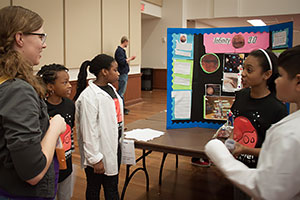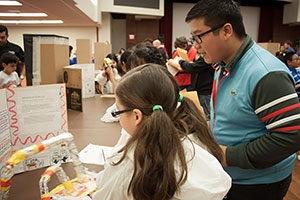
Mars Rover Event Builds Positive Attitudes Toward STEM Fields

Elementary and Middle School Students Present Team Projects
Watch out NASA; 655 elementary and middle school students have developed plans for future Mars Rovers.
The 13th Annual Mars Rover Celebration brought together 189 student teams showcasing their rover models. The event is the culmination of a six-week classroom or homework-based activity where students select a specific science mission and design a rover to complete the task.
“We want to excite and motivate these students to pursue science, technology, engineering and mathematics fields,” said Edgar Bering, organizer of the Mars Rover Celebration. “Through participation, students also learn how to work in teams on a goal-oriented, long-term task.”
Teams Research and Design Rovers on a Budget
A $25 limit on supplies helps students learn about budgets and project management. The low costs also make the event accessible to all schools.
 “Students are given design criteria for a rover and are required to do basic research on Mars to determine the operational objectives and structural features of their rovers,” said Bering, who is a professor of physics and electrical and computer engineering at the University of Houston.
“Students are given design criteria for a rover and are required to do basic research on Mars to determine the operational objectives and structural features of their rovers,” said Bering, who is a professor of physics and electrical and computer engineering at the University of Houston.
Thirty-one schools representing 19 school districts and private schools participated in the 2015 event.
“Student teams come prepared to present their rover mission and design to judges,” Bering said. “We encourage creativity through skits, props and costumes.”
Members of the aerospace community and UH alumni volunteered as judges as did UH students who served as judges and led student teams, parents and teachers through a series of STEM-related exhibits and activities.
NSM Students and Faculty Volunteer
More than 150 College of Natural Sciences and Mathematics students volunteered at the event. Faculty and staff also presented at the exhibits and worked registration.
 First-time volunteer Sherie Ruter, a computer science major, volunteered as part of the CSGirls student organization. “The kids did a great job and really researched and prepared on their project topic,” she said.
First-time volunteer Sherie Ruter, a computer science major, volunteered as part of the CSGirls student organization. “The kids did a great job and really researched and prepared on their project topic,” she said.
“This event opens your eyes to students who are interested in science fields. I liked that they worked in teams and were able to be creative with the projects,” said DonBosco Dan, a biology major graduating in May. “I would highly recommend volunteering.”
The event was supported by Marathon Oil Corporation and the American Institute of Aeronautics and Astronautics. The program also receives funding from a NASA Science Mission Directorate Opportunities in Education and Public Outreach for Earth and Space Science grant. UH groups supporting Mars Rover included teachHOUSTON, the Science Teaching Equity Project, Learning and Assessment Services, and the College of Natural Sciences and Mathematics.
Kathy Major, College of Natural Sciences and Mathematics